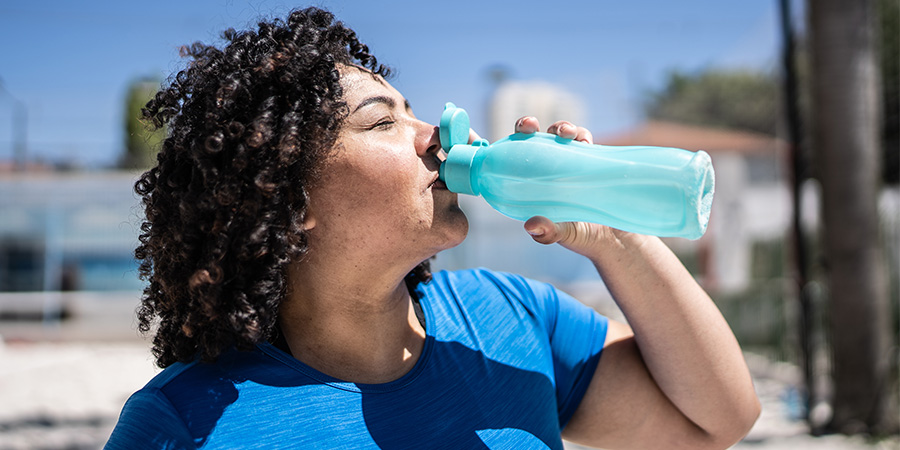Stay safe and active during the summer months
June 17, 2024
Summer is right around the corner and with it come days filled with sunshine, outdoor activities, and more laidback schedules. While summer is a time for most of us to lose some of the structure around our usual schedules, Shilpa Das, DO, MS, a family medicine physician at GBMC Health Partners Primary Care—Hunt Manor, reminds us daily exercise should remain on our calendars, regardless of the season.
“Any form of movement is better than nothing,” Dr. Das says. “You don’t have to go to the gym. Biking, hiking, and kayaking are all things you can do that are fun and keep you moving when the weather warms up.”
Walks are another easy way to get some activity in and enjoy the weather. If you go outside for your workouts in the coming months, Dr. Das cautions against overdoing it.
“Dehydration, heat exhaustion, and heat stroke can all be caused by overexertion in warm temperatures,” she warns. “If you’re outside for long periods of time or doing more physical activity than you’re used to, listen to your body and don’t push it.”
She adds you don’t have to be actively working out to overexert yourself. Even gardening can put you at risk if you’re not taking the proper precautions.
“Listen to your body and drink lots of water. If you start to see any of the signs of dehydration, stop what you’re doing and go inside,” she says.
The most obvious signs of dehydration are feeling thirsty, lightheaded, or dizzy. But the color of your urine is also a good way to check hydration status.
“The darker it is, the more hydration you need. The lighter, the better,” she explains. Other signs of dehydration and potential heat exhaustion are:
- Extreme fatigue
- Nausea
- Headache
- Dizziness
- Thirst that isn’t quenched by drinking water
Dr. Das says if you have any of those symptoms, get yourself inside and hydrated immediately to avoid heat stroke.
She says, “heat stroke is an emergency. If you think you or someone around you is suffering from heat stroke, call 911!”
Some of the signs of heat stroke are vomiting, confusion, slurred speech, or loss of consciousness. Because losing consciousness is a possibility, make sure you or the person potentially suffering from heat stroke is away from any hazards or sharp edges that could cause injury.
If you are dealing with dehydration or heat stroke, Dr. Das says cooling off the person suffering from potential heat stroke is the first priority.
“Cold water immersion is the best treatment, but you can place ice packs on the groin, armpits, head, and neck area to help cool someone off.”
Avoiding heat exhaustion and heat stroke during the summer months is all about proactivity. Dr. Das recommends working out during cooler times of the day, wearing and reapplying sunscreen regularly, and wearing protective clothing, such as a hat or SPF clothing. If you’re transitioning from indoor to outdoor workouts, especially if you’re a runner, Dr. Das suggests decreasing your current intensity and paying close attention to how your body reacts to the heat. Most importantly, she emphasizes the importance of staying hydrated.
“Not just during a workout, but before and after as well,” she explains. “If you’re going to be working out for under an hour, water is fine. But if you’re sweating a lot or the workout will be longer than an hour, you’ll want to drink something with electrolytes to ensure your body is replenished.”
Remember calling 911 should always be your first action in an emergency. If you need a primary care provider, Dr. Das is accepting new patients!







